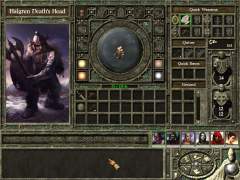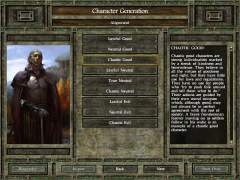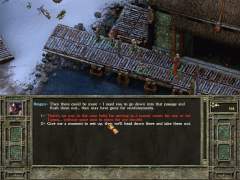 Home
News, and the latest updates.
Archives
Stories from the past...
Submit News
Got a item of interest? Here's the place to go.
Feedback
Your opinion always counts on how we can make GameSurge
even better.
Mailbag
Comments on our features, by you, the viewers. | 
Hardware
Tweaks, reviews and a handy driver index highlight our newest section
Reviews
Looking to buy one of the hottest games? We have it covered.
Previews
Get a advanced look at the games of tomorrow.
Interviews
Find out more about the people behind your favorite game.
Strategy
Need Help? We have a very large selection of walkthroughs now up.
Gallery
A special section featuring the best in artwork and
images. |

Editorials
The written word, by staff and viewers.
Game Guy
A bi-monthly column contributed by Mark H Walker, an independant writer in the Gaming community.
Gallery
Pictures from around the web.
Hosting
Our current hosting plans and features.
Site Information
Who we are, what we do, our policies and job positions.
|


PlayStation
The Sony PlayStation, and beyond...
Nintendo 64
Currently Down.
Dreamcast
The Dreamcast resource, and more. Home of the DC Technical pages. |
|
Icewind Dale 2 Review
Reviewed by Falcon
|
System Requirements
Win95+
P2 300Mhz+
32MB RAM
4x CD ROM
4MB+ 3D Accelerated Graphics Card
|
 |
Icewind Dale 2 is the sequel to Icewind Dale, and one of several RPGs
developed by Black Isle Studios following the D&D rules. The storyline
follows a generation after the events in the original game, where a new
threat has arisen in the northern town of Targos. A call to arms has made
for all available heroes to aid against the horde of evil creatures that
has been rampaging through the Ten-Towns. Your party is one such group
that has come to provide aid, and the storyline begins with the group landing
in the docks at the town, which has been overwhelmed by enemy forces.
It is not necessary to have played Icewind Dale to play the sequel,
but those who have played any of the RPG’s by Black Isle will be no strangers
to the type of gameplay that awaits in ID2. The manual claims to be using
a highly modified version of the “Bioware Infinity” engine - best known
from its use in the Baldurs Gate series. However, from past experience
with playing Baldurs Gate, the style of gameplay as well as graphics quality
have both remained quite similar.
Where the game does differ is with the introduction of a range of new
mystical creatures, both good and evil, as well as new weapons and spells.
ID2 uses the D&D 3rd Edition rules, as opposed to AD&D 2nd
Edition from the past games. For many, this information will have little
impact to gamers as the “dice rolls” and calculations are already calculated
behind the scenes and all that is left for gamers to watch is the resulting
attacks.
 As with the predecessors to the game, individual character selection
and design are available. Parties can consist of up to 6 characters that
can be designed from scratch, or recruited during missions. The nature
of your party will determine the ability to recruit different NPC’s as
the game progresses. A new feature included in ID2 is the ability to select
preset parties. These groups consist of a set of characters that have already
been created, and who have their own background and history. This can be
helpful to beginners to the game, who may not be familiar with the necessary
character attributes to create a successful starting party. As with the predecessors to the game, individual character selection
and design are available. Parties can consist of up to 6 characters that
can be designed from scratch, or recruited during missions. The nature
of your party will determine the ability to recruit different NPC’s as
the game progresses. A new feature included in ID2 is the ability to select
preset parties. These groups consist of a set of characters that have already
been created, and who have their own background and history. This can be
helpful to beginners to the game, who may not be familiar with the necessary
character attributes to create a successful starting party.
Making your own character varies from simple starting points as picking
a race and gender, to selecting alignment and skill attributes. It is important
to make these selections carefully, as they will have effects all throughout
the game including variation in available character dialogue, as well as
the ability to gain certain skills later in the game.
Under each race, a sub race can be chosen. E.g. Within the elf class,
there are also dark elves and half elves, each with slightly different
stat bonuses and penalties.
As well as choosing a race, a specific class can be chosen. For example,
a human can select to be a barbarian, cleric, sorcerer etc. Each class
has both bonuses such as increased movement speed, as well as restrictions
such as not being able to choose a certain alignment (good, neutral, evil
etc). Some classes may not be able to wear heavy amour, or have penalties/benefits
to use a specified item or weapon.
It is also possible to “multiclass”, i.e. after playing though to a
certain level as one class, a character can start training for skills in
a second class.
Of course, as the character experience increases, additional benefits
will be available to the characters including additional hitpoints more
powerful spells. Additionally, all units will suffer from the effects of
fatigue and require sleep in order to avoid penalties while fighting when
tired, as well as to be able to memorize or “recharge” their spells.
 The interface of Icewind Dale has not changed from the standard RPG
format. There is diagonally overhead view of the characters, with a lower
menu bar that includes game and character manipulation options. The game
is mostly point and click, but not just hack and slash. There are many
important considerations before entering a battle, including bonuses available
for stats, such as armor class from magical and physical sources. Also
the ability to use spells efficiently can easily turn a battle towards
your favour. For example spells can be used to scare enemies away, or provide
magical barriers against enemy attacks.
The interface of Icewind Dale has not changed from the standard RPG
format. There is diagonally overhead view of the characters, with a lower
menu bar that includes game and character manipulation options. The game
is mostly point and click, but not just hack and slash. There are many
important considerations before entering a battle, including bonuses available
for stats, such as armor class from magical and physical sources. Also
the ability to use spells efficiently can easily turn a battle towards
your favour. For example spells can be used to scare enemies away, or provide
magical barriers against enemy attacks.
Playing through Icewind Dale 2, you will encounter a series of monsters
from simple “bad guys” to kill and gain items/experience from, as well
as many Non Player Characters (NPC’s). The characters in your party can
engage in dialog with these NPC’s in order to obtain information, as well
as receive missions/quests. Some missions are optional and can bring in
rewards, while others are essential to your journey and must be fulfilled
to progress in the game.
There is a strategy involved in the way that you decide to interact
with others in the game - charisma and diplomacy attributes affect the
way that NPC’s will treat your party, but just as importantly the chat
options you choose from will have an effect on their responses. Even sitting
down at a bar and ordering drinks may provide valuable information from
a chatty bartender. Also, it is not necessary to play as a good aligned
character, you can choose to be evil, but you may find that townspeople
may be less welcoming, etc. Of course a sword could always be used as a
means of communication…
All in all over 100 hours of gameplay can be expected, and will vary
depending on how the game is played.

>> Back to reviews index
|
 |
|
|
Zalman: ZM-DS4F Headphones
|
An affordable, ultra-portable headphone set.
 more more
|
|
